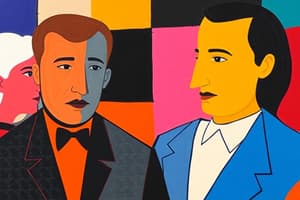Podcast
Questions and Answers
How does the habitus shape our emotional responses in social contexts?
How does the habitus shape our emotional responses in social contexts?
The habitus influences which emotions are valued or expected in different social situations, guiding our emotional expressions.
What are the main differences between 'habit' and 'habitus'?
What are the main differences between 'habit' and 'habitus'?
'Habit' refers to unconscious repeated actions, whereas 'habitus' is a broader concept that includes social, cultural, and economic influences on behavior.
In what ways did Gareth Wiltshire and colleagues apply Bourdieu's theory to health inequalities?
In what ways did Gareth Wiltshire and colleagues apply Bourdieu's theory to health inequalities?
They argued that the habitus informs physical practices, leading to differences in health outcomes between rich and poor individuals.
Why is it important to recognize the concept of habitus in social analysis?
Why is it important to recognize the concept of habitus in social analysis?
How does the habitus influence physical behavior and responses to stress?
How does the habitus influence physical behavior and responses to stress?
What are the three ways Gottfried Wilhelm Leibniz imagined clocks could be synchronized?
What are the three ways Gottfried Wilhelm Leibniz imagined clocks could be synchronized?
How does Pierre Bourdieu relate human interaction to synchronized clocks?
How does Pierre Bourdieu relate human interaction to synchronized clocks?
Define 'habitus' in the context of Pierre Bourdieu's theory.
Define 'habitus' in the context of Pierre Bourdieu's theory.
What is the role of 'field' in Bourdieu's theory?
What is the role of 'field' in Bourdieu's theory?
How does 'cultural capital' provide advantages to individuals in society?
How does 'cultural capital' provide advantages to individuals in society?
What is Bourdieu's stance on the relationship between individual and society?
What is Bourdieu's stance on the relationship between individual and society?
How does the concept of 'habitus' influence behavior in different social fields?
How does the concept of 'habitus' influence behavior in different social fields?
In what way does social class impact habitus and individual choices?
In what way does social class impact habitus and individual choices?
Flashcards
Habitus
Habitus
The social, cultural, and economic factors that shape our actions and beliefs.
Habitus & Emotions
Habitus & Emotions
Habitus influences how we feel and react emotionally in different situations.
Habitus & Physicality
Habitus & Physicality
Habitus shapes our physical actions, like body language and responses to stress.
Habitus vs. Habit
Habitus vs. Habit
Signup and view all the flashcards
Wiltshire et al.
Wiltshire et al.
Signup and view all the flashcards
Health Inequalities
Health Inequalities
Signup and view all the flashcards
Bourdieu's theory
Bourdieu's theory
Signup and view all the flashcards
Leibniz's Clock Synchronization
Leibniz's Clock Synchronization
Signup and view all the flashcards
Bourdieu's Social Clock
Bourdieu's Social Clock
Signup and view all the flashcards
Habitus
Habitus
Signup and view all the flashcards
Field (Bourdieu)
Field (Bourdieu)
Signup and view all the flashcards
Cultural Capital
Cultural Capital
Signup and view all the flashcards
Structuralism
Structuralism
Signup and view all the flashcards
Postmodernism/Existentialism
Postmodernism/Existentialism
Signup and view all the flashcards
Bourdieu's Approach
Bourdieu's Approach
Signup and view all the flashcards
Habitus and Social Fields
Habitus and Social Fields
Signup and view all the flashcards
Habitus and Strategies
Habitus and Strategies
Signup and view all the flashcards
Habitus and Social Class
Habitus and Social Class
Signup and view all the flashcards
Study Notes
Gottfried Wilhelm Leibniz
- Imagined three ways clocks could be synchronized:
- Mutual influence
- Skilled workman correcting and synchronizing
- Constructing clocks with such precision that they would always agree
Pierre Bourdieu
- French sociologist who sought to understand how human interaction is similar to synchronized clocks
- Questioned how society is glued together and how we are both free and constrained by social rules
- Theory focused on the interplay between objective facts about society that affect us all and how we live and embody these facts in our own subjective ways
Pierre Bourdieu: Key Concepts
- Habitus: A predisposition, tendency, or inclination that shapes our actions based on social expectations and probabilities.
- Field: The range of objective possibilities within a society, including job opportunities, products available, etc.
- Cultural Capital: The knowledge, skills, and cultural assets that give individuals social and economic advantages.
Philosophical Context
- Structuralism: Advocated for universal rules that govern all societies.
- Postmodernism and Existentialism: Emphasized individual subjectivity and the impossibility of pinning down universal truths.
- Bourdieu's Approach: Rejected the rigid division between individual and society, arguing that they are interconnected through the habitus.
Habitus Explained
- How our behavior is regulated without explicitly following rules.
- Our actions are shaped by our expectations of others' responses and the probability of certain outcomes.
- Organizes us by creating a sense of "what is likely" and "what is not likely" within different social settings.
Habitus and Social Fields
- Different social fields (e.g., universities, careers, subcultures) have different ways of doing things, rules, and styles.
- The habitus is developed through our interactions within these fields, influencing our choices and strategies.
Habitus and Strategies
- We develop strategies, often unconsciously, based on our perception of success, challenge, and social expectations.
- These strategies are influenced by our habitus and reflect our understanding of the social world.
Habitus and Social Class
- Different social classes have different habits, shaping their perceptions of reasonable and unreasonable actions.
- This influences their choices and opportunities, often passed down from parents to children.
Habitus and Emotions
- The habitus shapes our emotional responses to situations.
- Certain emotions are valued or expected in different social contexts.
Habitus and Physicality
- The habitus also influences our physical behavior, affecting our movements, speech patterns, and even muscle responses to stress.
Gareth Wiltshire and Colleagues
- Utilized Bourdieu's theory to understand causes for early age health inequalities between rich and poor
- Argued that the habitus influences physical practices, leading to disparities in health outcomes
Habitus vs Habit
- Habit: A repeated action or behavior that is often unconscious.
- Habitus: A broader, more flexible concept that encompasses the social, cultural, and economic factors that shape our actions and beliefs.
Significance of Bourdieu's Concepts
- The habitus encourages us to consider the social forces that influence our choices and behaviors, even when we believe our actions are based on personal preferences.
- Recognizing the habitus can help us identify social inequalities and develop strategies to address them.
Studying That Suits You
Use AI to generate personalized quizzes and flashcards to suit your learning preferences.




